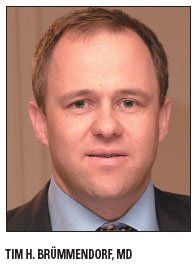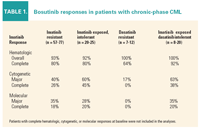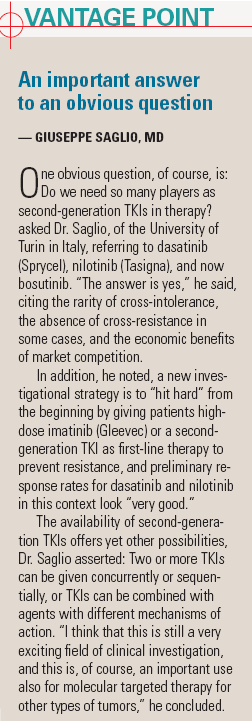New TKI promising for intolerant or resistant chronic myelogenous leukemia
The investigational tyrosine kinase inhibitor bosutinib has an acceptable safety profile and appears to be efficacious among patients with chronic-phase chronic myelogenous leukemia who have intolerance or resistance to other TKIs, according to new data presented at ASCO 2008 (abstract 7001).
ABSTRACT: The second-generation TKI appears safe and active in patients with CML who have resistance or intolerance to other TKIs.

CHICAGO-The investigational tyrosine kinase inhibitor bosutinib has an acceptable safety profile and appears to be efficacious among patients with chronic-phase chronic myelogenous leukemia who have intolerance or resistance to other TKIs, according to new data presented at ASCO 2008 (abstract 7001).
Bosutinib (SKI-606, Wyeth), a dual inhibitor of the Src and Bcr-Abl tyrosine kinases, inhibits growth and proliferation of CML cells in vitro, including most of those harboring mutations conferring imatinib (Gleevec) resistance, said lead investigator Tim H. Brmmendorf, MD, a hematologist-oncologist at the University Hospital Hamburg-Eppendorf in Germany.
“As opposed to dasatinib [Sprycel] and nilotinib [Tasigna], bosutinib does not inhibit the PDGF receptor or c-KIT at clinically relevant concentrations,” he added.

In the dose-escalation part of the phase I-II trial, patients with chronic-phase, imatinib-resistant CML received 400 to 600 mg of bosutinib daily. In the efficacy part of the trial, patients with Philadelphia-chromosome-positive CML of any phase with imatinib resistance or intolerance, some of whom also had resistance or intolerance to second-generation TKIs, were treated with 500 mg daily.
A total of 257 patients participated in the trial. The median duration of treatment was 5.3 months. Some 44% of patients required temporary dose interruptions, and 29% required dose reductions.
Response rates

Bosutinib appeared active in patients with chronic-phase disease, Dr. Brmmendorf observed (see Table 1). Not surprisingly, rates of cytogenetic remission were somewhat higher in the imatinib-intolerant group, compared with the imatinib-resistant group, he noted.
Similarly, although numbers were smaller, remission rates were higher among dasatinib-intolerant than dasatinib-resistant patients.
Of 104 patients tested, 42% had mutations. Response rates appeared higher for patients with P-loop mutations than for those with non-P-loop mutations and those without mutations, Dr. Brmmendorf observed.
In analyses of responses for each of the 18 distinct mutations identified, “one can see that bosutinib exerts activity also in vivo across a wide range of mutations,” he noted. “Particularly P-loop mutations seem to respond quite well . . . with the exception, of course, of the T315I mutation, where we couldn’t achieve any major cytogenetic remissions.”
Toxicities
Among the 257 patients overall, the most common grade 3-4 nonhematologic adverse events were rash (9%), diarrhea (8%), and infection (4%), and the most common grade 3-4 laboratory abnormalities were thrombocytopenia (19%), neutropenia (10%), hypophosphatemia (8%), and elevated alanine aminotransferase levels (8%). Overall, 29% of patients discontinued treatment.
“Bosutinib has clinical efficacy in chronic-phase CML resistant or intolerant to imatinib and other TKIs,” Dr. Brmmendorf concluded, with activity across numerous mutations and an acceptable toxicity profile as well.
“Of course, given the short follow-up so far, the durability of the responses will require further follow-up,” he acknowledged.